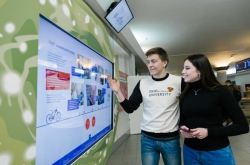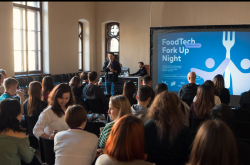One of the hackathon’s main goals is to “build a bridge” between students and business. Participants will be solving real-world cases provided by Russian manufacturers in pharmacology, cosmetics, chemical industry, and foodtech. At each stage of their work, Master’s students will be able to seek guidance from business representatives and researchers. At the end of the hackathon, students will present their MVPs (minimally viable products).
“Our goal is to reach a synergy between business and science. Entrepreneurs know the real tasks faced by their business, how to determine the net cost of a new product, what to take into account during its launch, what possible limitations there can be in manufacturing, and what a particular audience might need. Scientists, on the other hand, can suggest concepts for innovative projects to solve particular tasks based on the information provided by businesses. As a result of this collaboration, we get a new and relevant product. It’s not as effective for business or science to work on their own – only in collaboration can we get a sustainable result. Moreover, there is an unmet demand for specialists on the market and students are our future. This is the time to contribute to the growth of these young professionals who will graduate in a couple of years and start changing our lives. Some of them will become entrepreneurs. If they get the experience of interacting with businesses now, they will be able to launch their own projects in the future much quicker,” says Natalia Chankina, one of the hackathon’s organizers and CEO of VERDE TECH.

Natalia Chankina and Mikhail Kurushkin. Photo by Shamil Troyanovsky / Megabyte Media
The tasks for the hackathon were provided by participating companies. Among the cases are a quick and safe water purification system, an enzyme-based industrial laundry detergent, a casing for targeted drug delivery, pollen traps to monitor allergens in the air, a new product based on on the manufacturing by-products of cheese and butter, a safe pigment for meat products, lactose-free ice cream, and a treatment for scars and deep wounds.
“At the university, we engage in frontier science. Working with students is a special process – with their unlimited imagination and enthusiasm, they can develop any idea they want, focusing only on the end result, without considering the technological and production limitations that developers may encounter during the implementation stage. Through collaboration, businesses will get new and original solutions to their problems, while students will find themselves in new surroundings. Hackathon participants will learn about the current needs of businesses and will be able to test their ideas outside of the university vacuum. It is expected that in the final presentation, participants will showcase a product that can be launched on the Russian market,” says Svetlana Sultanova, the vice dean of ITMO’s Faculty of Biotechnologies.

Svetlana Sultanova. Photo by Shamil Troyanovsky / Megabyte Media
There are 11 teams in the hackathon in total, each consisting of 8-10 members. All participants are first-year Master’s students of ITMO’s Faculty of Biotechnologies. The hackathon is part of the course Innovative Project, meaning that students work on their cases in parallel to their studies.
“The most important thing I am hoping to gain at the hackathon is the opportunity to dive into project work and what comes with it: great atmosphere, communication with new people, deadlines, brainstorms, and the drive to win. Moreover, we’ll be able to learn up-to-date information about an industry we are interested in. I think that such experiences that are merged into your studies are hard to find,” says Georgyi Guriev, a participant of the hackathon.
In December, the teams will present their first results and receive recommendations from hackathon experts. In April 2025, participants will present their final projects. That’s also when the winners slated to receive 1 million rubles will also be announced. The prize fund was pooled by the partner companies.











